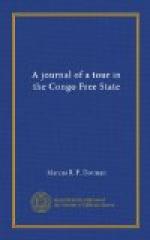The day before we reached Banzyville we found the steamer of the French Company and paid a visit to the Director, where we drank to the Anglo-French agreement, news of which had just arrived. Every Frenchman in Africa is delighted with the gift of territory as every Englishman should be with the settlement of so many prickly questions.
[Illustration: SANGO NATIVES OF THE UBANGI.]
[Illustration: THE UPPER UBANGI]
CHAPTER VI.
The Upper Ubangi.—Banzyville to Yakoma.
Banzyville has been built on a beautiful site at a double bend of the river. Opposite is the French Post of Mobaie and between them roars a rapid. The country on each side is hilly, while the soil is rocky, great boulders of granite and quartz lying about in isolated grandeur. We reach the Post on the morning of September 26th and are met by Captain Auita, an Italian, who is the Zone Chief here. The buildings are arranged on two sides of a square, the other two being formed by the river as it turns to the left, and the open space is covered with gravel which makes a welcome change from sand and clay while the house placed at our disposal looks particularly inviting after a week of tents and the small launch. Everything is wet through and has to be spread out on the gravel to dry under nature’s great fire. Unfortunately some of the skins, which perforce have been left in cases for a week, under water one minute and baked in the sun the next, have hopelessly rotted and have to be thrown away. Next morning we interviewed numbers of native Chiefs who were all very anxious to exchange lances and other curiosities for European clothes. All were content with Bulamatadi, although some grumbled at the necessity to find porters and paddlers.




